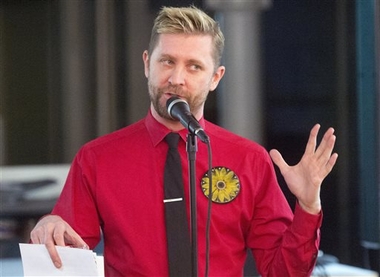Utah proposal would protect LGBT people from hate crimes

SALT LAKE CITY (AP) — A new proposal could make it a hate crime in Utah to harm someone because they are gay or transgender.
A bill unveiled by a Republican lawmaker on Thursday would dole out stiffer penalties for crimes against people or their property that are motivated by the victim's sexual orientation, gender identity, race, disability, gender or other protected traits.
Equality Utah Executive Director Troy Williams said Utah's current hate crimes law has no protections for gay or transgender residents and little protections for other groups.
"The straight, white Mormon will be protected by our law, as well as the African-American, gay Muslim," Williams said Thursday.
Utah is one of 15 states with hate crime laws that lack protections for sexual orientation and identity, according to the Human Rights Campaign.
St. George Republican Sen. Steve Urquhart sponsored the measure. He also sponsored Utah's landmark LGBT anti-discrimination bill last year that passed after being endorsed by the Salt Lake City-based Mormon church.
Urquhart's proposal has not yet been scheduled for a hearing.
Urquhart was not available Thursday for comment and did not immediately return a message.
Williams said Equality Utah is working with the senator, the American Civil Liberties Union of Utah and others on the measure. When asked if The Church of Jesus Christ of Latter-day Saints would join the push, as it did with the anti-discrimination law last year, Williams said he planned to meet with church officials Thursday night to discuss the bill and whether the faith would support it.
Church spokeswoman Kristen Howey said the faith has not taken a position on the idea.
Republican Gov. Gary Herbert said it's worth discussing whether the law is needed. But he cited concerns that when it comes to protections, "We keep creating categories."
"We're all Americans. And if I do violence to you, whoever you are, I ought to be punished for it," he said.
Herbert said he imagines most violent crimes are motivated by some kind of hate. "Whether it's amplified because it's a so-called hate crime, as opposed to, if I kill you, you're just as dead as if whether I hated you or I loved you and killed you. I don't understand how that works," he said.
Williams has cited a case from late 2014, where two gay men were beaten outside a Salt Lake City apartment complex. The victims said two men yelled gay slurs and made explicit sexual comments before attacking them.
They suffered cuts and bruises, but prosecutors were unable to prove the attack was a hate crime under the current law, Williams said.
Under Urquhart's bill, prosecutors would have to prove an offender committed the crime because they believed the victim was gay or transgender. It wouldn't matter if the victim actually was gay or transgender.
The hate crime charge also would bring higher penalties. For example, someone convicted of aggravated assault in Utah can get one to 15 years in prison if the victim suffers serious injuries. Under the hate crimes proposal, anyone committing an assault because of a victim's sexual identity or another protected trait would be eligible for five years to life in prison.
The proposal would also require the state to track the number of hate crimes committed in the state based on various factors such as a victim's sexual orientation or race.
By Michelle L. Price, AP. Copyright 2016 The Associated Press. All rights reserved. This material may not be published, broadcast, rewritten or redistributed.
The Gayly - 1/28/2016 @ 5:34 p.m. CST





